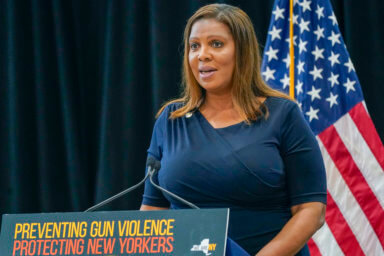James releases written testimony on New York’s mental health crisis

New York Attorney General, Letitia James on Monday released written testimony submitted to the Office of the Attorney General (OAG) in the public hearing on the quality and accessibility of mental health care statewide.
James said government officials, health care providers, community organizations and impacted New Yorkers submitted testimony regarding several issues, including but not limited to a lack of psychiatric care beds for adults and children, stigmatized perceptions of mental illness and connections to the criminal legal system.
“I am grateful to the New Yorkers who provided testimony in this important hearing on the mental health crisis facing our state,” said Attorney General James. “The conditions and experiences detailed through data and personal anecdotes were illuminating, though unfortunately not surprising.
“This crisis affects all of us, though all too often, our most vulnerable neighbors are disproportionately impacted: young people, communities of color, justice-involved individuals, and unhoused New Yorkers,” she added. “My office will use what we learned to ensure that our state provides adequate, appropriate, and culturally competent care to all those who need it.”
Across the state, James said New York communities are struggling to access mental health care, which has only become more difficult amidst the COVID-19 pandemic.
Since the pandemic began, she said hundreds of inpatient psychiatric beds have been eliminated, converted to COVID-related or general medical use, or have been completely taken out of commission.
This year, the attorney general said it is estimated that there are fewer than 5,000 adult short-term inpatient psychiatric beds in hospitals across the state, which is 96.5 percent fewer beds than in the 1960s.
According to ProPublica, New York has just 274 psychiatric beds for children and adolescents.
James said while the COVID-19 pandemic exacerbated the barriers New Yorkers face in accessing mental health care, this crisis is not a new one.
She said the Social Security Amendments of 1965 created Medicare and Medicaid, but also codified the Institutions of Mental Disease Rule, which forbids Medicaid reimbursements for mental health care facilities that treat patients aged 21 through 64 with more than 16 beds.
Compounded with low Medicare and Medicaid reimbursment rates for mental health care and a shrinking availability of beds (between the years 2000 and 2018, New York state eliminated 12 percent of its psychiatric care beds), James said uninsured and underinsured New Yorkers are left unable to receive the care they need.
“The lack of access to inpatient psychiatric care leads to increased homelessness, incarceration, and more frequent hospital visits,” she said. “As COVID-related hospital visits decline, emergency departments are overwhelmed by individuals who require more intensive psychiatric services but are unable to access necessary psychiatric inpatient beds or services in the community, which can exacerbate their illness.”
In confronting the state’s mental health crisis, James said last month’s hearing sought to understand the many and varied aspects of the mental health crisis and recommended solutions.
Witnesses were invited to share their experiences and answer questions from Attorney General James and other esteemed members of the panel, as well as submit written testimony to share greater detail.
James said testimony revealed various factors contributing to the current mental health crisis in New York.
In addition to a shortage of psychiatric beds, generalized stigma, and the criminalization of mental illness, she said witnesses identified inadequate Medicaid reimbursement rates, a lack of long-term care options and long wait times for those seeking care.
Regarding mental health emergencies, the attorney general said several witnesses called for increased investments in resources and services to prevent crises before they happen, rather than continued prioritization of crisis response efforts.
She said the disparate impact of the crisis on New Yorkers experiencing homelessness was repeated throughout testimony, with many supportive care providers highlighting how unhoused individuals are often prematurely discharged or rejected from care entirely.
Parents of children who had experienced mental health emergencies also provided testimony regarding the extreme shortages of care available to young people, James said.
The attorney general was joined by First Deputy Attorney General Jennifer Levy, Chief Deputy Attorney General for Social Justice Meghan Faux, and Assistant Attorney General and Special Assistant to the First Deputy Attorney General Gina Bull for the duration of the hearing.
James said she wants to hear from individuals who have had problems accessing emergency care for an acute psychiatric condition.
She said this may include issues where an emergency department did not adequately stabilize a psychiatric condition; did not adequately screen someone seeking treatment for an emergency medical condition; or transferred an individual to another facility before their condition was adequately stabilized.
Please submit any reports online or call OAG’s Health Care toll-free helpline at 1 (800) 428-9071.




